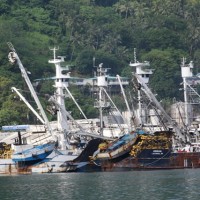
The US flagged tuna purse seine fleet in the Pacific has seen some relief from two issues that have vexed vessels since the COVID-10 pandemic intensifies in recent months, a fleet representative has told Undercurrent News.
In March, it was reported that the US flagged fleet based in American Samoa was under increasing strain as pandemic related restrictions imposed across the Pacific complicated putting fishing observers on boats and returning them to their homes once their trips were finished.
Additionally, with travel being shut down across the region and most of the islands closing their ports to foreign vessels, it has become increasingly difficult for the fleet to unload its catch, William Gibbon –Fly the executive director of the American Tunaboat Association told Undercurrent News.
“Thankfully,” he said, “the fleet has experienced good news on both fronts in the past week.”
With regard to the observer issue, the region’s key organizations are all working in concert he said.
These include the Pacific Islands Forum Fisheries Agency, and the Parties to the Nauru Agreement, the US National Oceanic and Atmospheric Administration (NOAA) and the Western and Central Pacific Fisheries Commission (WCPFC).
The groups have issued waivers temporarily exempting the fleet from the national requirement to carry observers.
While that still leaves the question of what to do with the fishing observers currently stationed on vessels, those individuals have simply opted to stay on for another fishing trip in the interim, Gibbons-Fly said.
“The observers seem fine with this. They’ve all said they’re comfortable staying on board. A boat in the middle of the Pacific Ocean may be the safest place to be right now. And the boats operating out of American Samoa. American samoa is still COVID-free. Those boats in particular, are the safest place where these guys could be right now,” he said.
He added that that solution, of course is temporary.
“It’s still complicated and we’re still going to have to find a way at some point to get these folks home if this situation is prolonged for an extended period of time,” Gibbons-Fly added.
The fleet consists of two dozen US flagged vessels, some of which are based in American Samoa and some of which operate further afield.
It’s the latter group that is having trouble finding a port to offload their tuna in.
“The new issue we’re facing is with respect to boats that don’t come back to American Samoa but transship their catch,” he said. Adding that the usual island trans shipment destinations, the Marshall islands, Tuvalu, Micronesia and Kiribati, have all closed their ports to foreign vessels.
Even though regulations normally prohibit vessels from trans shipping their catches at sea, the issue was poised to create another bottleneck for the fleet.
However, an April 20 decision from the WCPFC to allow trans shipment in sea areas that are designated by the island states should serve as a solution to this problem.
US regulators followed suit, Gibbon fly said,.
On the basis of that decision, NOAA issued guidance to the fleet that will allow the fleet to operate in a manner consistent with the WCPFC decision, he said.
The official added that the American Tunaboat Association has worked well with NOAA and other organizations to resolve these issues as they’ve come up.





